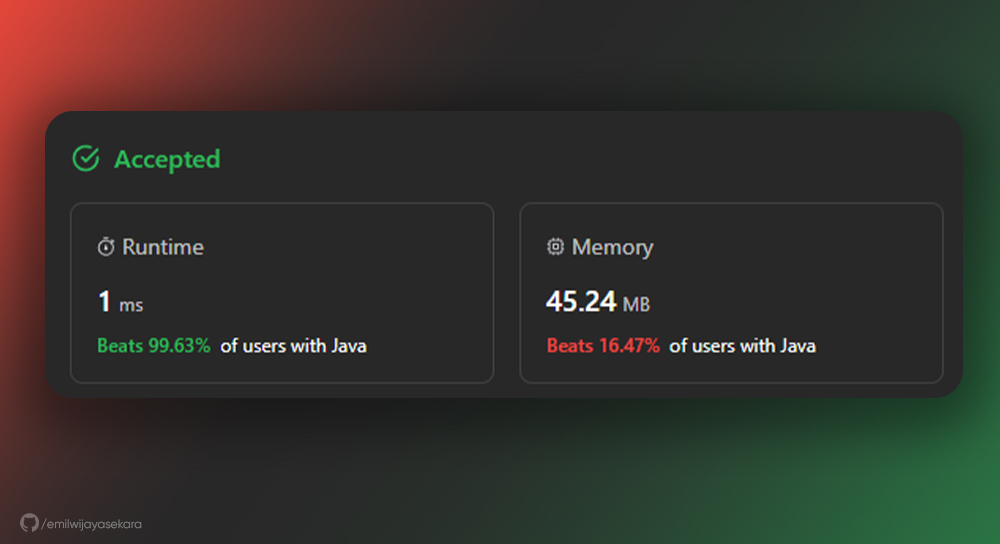https://github.com/emilwijayasekara/leetcode-412-fizz-buzz
LeetCode Problem 412. Fizz Buzz - The FizzBuzz problem requires generating a sequence of strings from 1 to 'n', where each number is replaced by "Fizz," "Buzz," "FizzBuzz," or itself based on specific divisibility rules.
https://github.com/emilwijayasekara/leetcode-412-fizz-buzz
java leetcode leetcode-java leetcode-solutions
Last synced: 10 months ago
JSON representation
LeetCode Problem 412. Fizz Buzz - The FizzBuzz problem requires generating a sequence of strings from 1 to 'n', where each number is replaced by "Fizz," "Buzz," "FizzBuzz," or itself based on specific divisibility rules.
- Host: GitHub
- URL: https://github.com/emilwijayasekara/leetcode-412-fizz-buzz
- Owner: EmilWijayasekara
- Created: 2024-01-04T15:29:14.000Z (almost 2 years ago)
- Default Branch: main
- Last Pushed: 2024-01-11T15:50:07.000Z (almost 2 years ago)
- Last Synced: 2025-01-12T06:09:42.029Z (11 months ago)
- Topics: java, leetcode, leetcode-java, leetcode-solutions
- Language: Java
- Homepage: https://leetcode.com/problems/fizz-buzz
- Size: 3.91 KB
- Stars: 0
- Watchers: 1
- Forks: 0
- Open Issues: 0
-
Metadata Files:
- Readme: README.md
Awesome Lists containing this project
README
# LeetCode Practice (Day 17)
## Achievements
[](https://postimg.cc/QKd17khR)
## About the problem
- *Problem Number* : 412
- *Problem Name* : [Fizz Buzz](https://leetcode.com/problems/fizz-buzz/description/ "https://leetcode.com/problems/fizz-buzz/description/")
- *Problem difficulty* : Easy (71.30%)🟢
- *Programming language used* - Java
## Problem
Given an integer `n`, return _a string array_ `answer` _(**1-indexed**) where_:
- `answer[i] == "FizzBuzz"` if `i` is divisible by `3` and `5`.
- `answer[i] == "Fizz"` if `i` is divisible by `3`.
- `answer[i] == "Buzz"` if `i` is divisible by `5`.
- `answer[i] == i` (as a string) if none of the above conditions are true.
**Example 1:**
```
Input: n = 3
Output: ["1","2","Fizz"]
```
**Example 2:**
```
Input: n = 5
Output: ["1","2","Fizz","4","Buzz"]
```
**Example 3:**
```
Input: n = 15
Output: ["1","2","Fizz","4","Buzz","Fizz","7","8","Fizz","Buzz","11","Fizz","13","14","FizzBuzz"]
```
**Constraints:**
- `1 <= n <= 104`
## Approach Explanation
In my solution to the FizzBuzz problem, I iterated through the numbers from 1 to `'n'`, checking the divisibility conditions to determine the appropriate string representation for each number. I first converted the current number to a string (`num`) to handle cases where the number doesn't meet any of the FizzBuzz conditions.
For each number, I checked if it was divisible by both 3 and 5, and if so, I added "FizzBuzz" to the list. If not, I checked individually for divisibility by 3 or 5 and added "Fizz" or "Buzz" accordingly. If the number didn't meet any of these conditions, I added its string representation to the list.
This approach ensures that each number is accurately categorized based on the FizzBuzz rules, and the resulting list reflects the Fizz, Buzz, and FizzBuzz sequence up to the given integer `'n'`. The use of string representations simplifies the process and enhances readability in constructing the FizzBuzz output.
### If you have suggestions for improvement or would like to contribute to this solution, feel free to create a pull request. 🙌😇